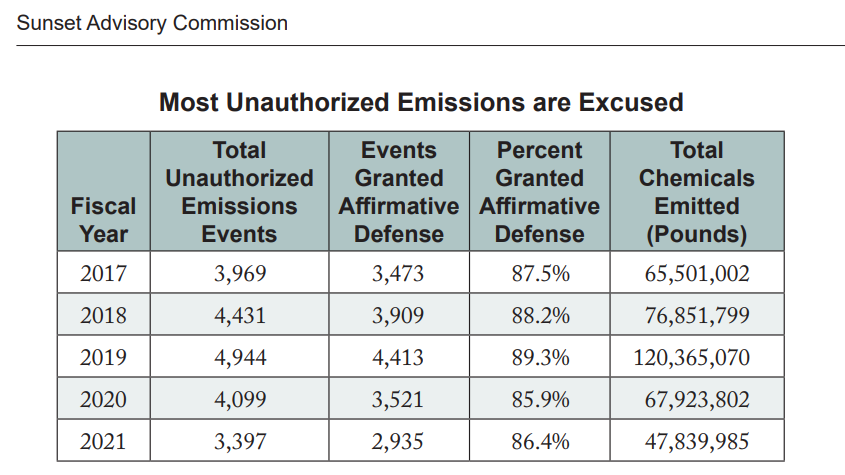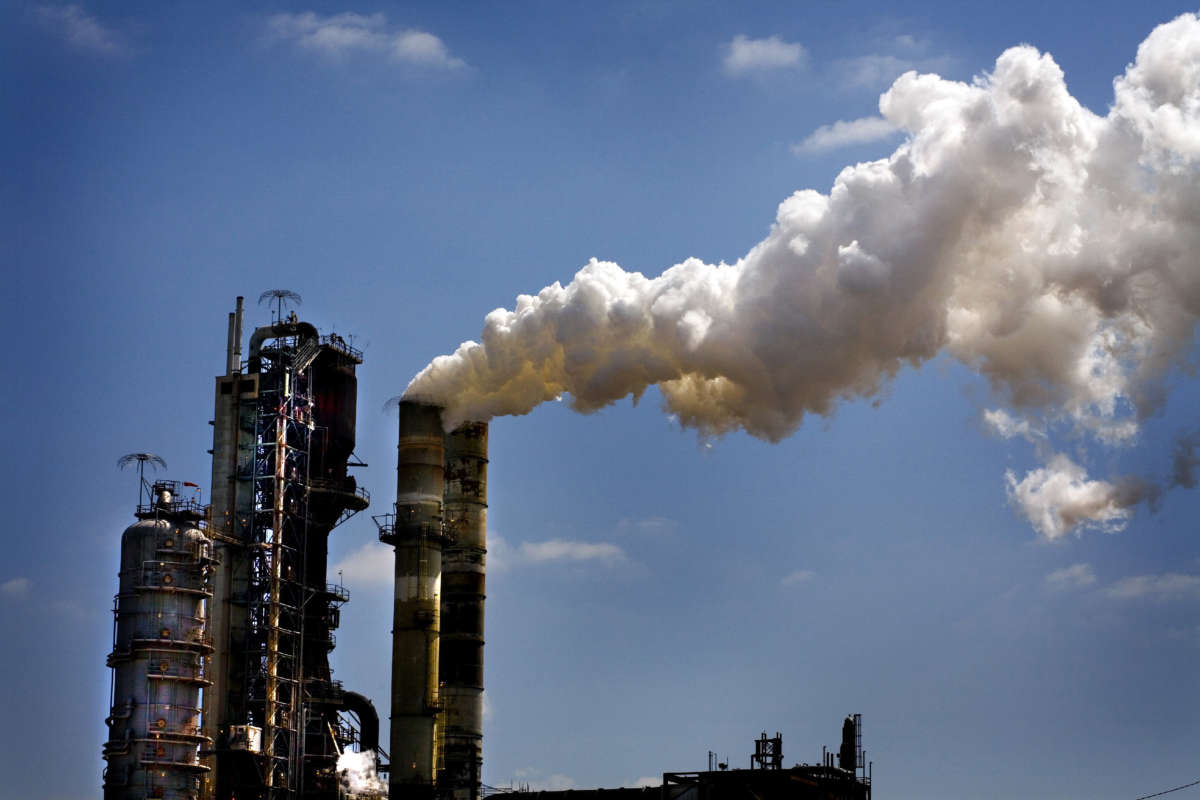A new ruling on Environment Texas v. ExxonMobil is expected this August. In its second appeal, ExxonMobil is asking the Fifth Circuit Court of Appeals to restrict the rights citizens have to sue polluters in federal court. One presiding judge, Trump-appointed Federalist Society member Andrew Oldham, agrees.
The largest American oil company has already lost the 12-year-old Clean Air Act citizen lawsuit twice. In 2010, Environment Texas and Sierra Club sued ExxonMobil on behalf of residents of Baytown, Texas, who suffered respiratory and other illnesses as a result of toxic emissions from the company’s Baytown plant, its largest in the world.
In 2017, U.S. District Judge David Hittner ordered the company to pay a $20 million penalty to the U.S. Treasury, the biggest citizen’s suit penalty to date. After the Fifth Circuit overturned that ruling on Exxon’s first appeal, Hittner knocked the penalty down to $14.25 million. Now, ExxonMobil is arguing that Baytown residents have no legal standing to bring the lawsuit to federal court.
Even though the EPA maintains its ability to regulate pollutant emissions after the Supreme Court hamstrung the agency’s ability to reduce greenhouse gas emissions, the EPA and state environmental agencies, like the one in Texas, have faltered in enforcing the Clean Air Act. Citizen lawsuits have long been used to hold polluters accountable when federal and state agencies fail to act. If the Fifth Circuit agrees with ExxonMobil’s argument, this would deal a devastating blow to any environmental group or community that seeks to bring a citizen lawsuit to federal court.
Sharon Sprayberry is one of the key witnesses for the plaintiffs in Environment Texas v. ExxonMobil. Sprayberry had first tried reporting to the EPA the incidents of chemical emission flares she witnessed coming from ExxonMobil’s Baytown plant, located less than two miles away from her home.
“The first time I heard it, I thought it was a tornado. It was like a freight train roar,” Sprayberry said. “I looked at the sky and it just lit up bright orange…. It started at one or two in the afternoon and it went all night, and it never ever got dark.”
After several failed attempts to get the EPA to act, Sprayberry says the EPA then passed her on to the Texas Commission on Environmental Quality (TCEQ) which then “twirled me around and did nothing.”
Using data from the EPA’s own annual enforcement reports, the Environmental Integrity Project found that the yearly average number of inspections, investigations and prosecutions have declined by half over the past 20 years, a decline that started before the Trump administration. The report cites the EPA’s deference to states to enforce environmental laws as a primary reason for this decline.
The Texas Commission of Environmental Quality (TCEQ), tasked to enforce federal and state environmental laws, is headed by three commissioners appointed by the governor. This year, the TCEQ is up for review by the Sunset Advisory Commission, a group of 10 state legislators and two laypeople, who review the performance of the state’s agencies every 12 years. During a hearing, the Sunset Advisory Commission called the TCEQ “reluctant regulators.”
The Sunset Advisory Commission’s report notes that TCEQ relies on the industry to self-report and self-monitor illegal emissions. The agency has no compliance history data for 400,000 facilities, 89 percent of facilities across the state. Even when facilities do report their emissions, the TCEQ does not pursue any action when plants explain the illegal emissions were “unplanned, unavoidable, and properly reported,” a legal concept called “affirmative defense.” According to the report, over the last five years, TCEQ has granted affirmative defenses for an average of 87 percent of unauthorized emission events reported annually. That is an average of 76,096,332 pounds of illegally emitted pounds of chemicals each year.

Another Environmental Integrity Project report revealed that TCEQ only penalized 3 percent of air pollution violations from 2011 to 2016. Even when penalties are issued by the TCEQ, they are usually small and oftentimes less than the cost of maintaining or upgrading equipment to comply with emission standards.
In his 2017 decision, Judge Hittner found that ExxonMobil committed, over a period of five years, 16,386 days of violation under the Clean Air Act, emitting 8 million pounds of hazardous pollutants more than what’s allowed by state and federal law and clean air permits. Before the lawsuit, TCEQ had failed to issue any corrective action or penalties against the company’s Baytown complex. After the lawsuit was filed, ExxonMobil then requested TCEQ to issue a penalty to them, so that the company could get the citizen lawsuit dismissed.
According to the testimony of Barry Baisden, ExxonMobil’s former manager of Safety, Security, Health & Environment at the Baytown complex, and the testimony of John Sadlier, former head of enforcement for TCEQ, ExxonMobil approached TCEQ after the lawsuit was filed and drafted its own order of penalty for TCEQ to issue. The order imposed a penalty of $98,000, half of which ExxonMobil was allowed to pay to the industry-run Houston Regional Monitoring Corp, of which ExxonMobil is a board member.
Sprayberry found Environment Texas and joined the citizen lawsuit after years of suffering from respiratory illnesses. Growing up a couple miles from the facility, Sprayberry was diagnosed with asthma at 3 months old, avoided outdoor play and trick-or-treating, slept with her back propped up, and learned how to read the direction and timing of the wind to breathe. Even with all these precautions, she ended up in the hospital with dyspnea (shortness of breath) several times a year during her childhood, describing the experience as “breathing through a tiny, tiny, little straw.”
It wasn’t until Sprayberry left Baytown at the age of 18 that she was “given new lungs,” as she puts it. She proceeded to join the U.S. Navy, where she jumped out of helicopters, climbed walls and endured strenuous physical activities she never thought possible before.
When Sprayberry and her mom moved back to Baytown 36 years later for a job opportunity, she found that the ExxonMobil plant had expanded exponentially, her respiratory problems returned, her mother developed heart problems, and she then learned that colleagues in the school district where she was working were dying from cancer.
The EPA’s standard for an acceptable level of cancer risk is 1 in 10,000. This means that out of 10,000 people living in an area, there would likely be one additional case of cancer due to exposure to toxic pollutants. ProPublica’s map, based on EPA data of cancer risks by pollutant emission, shows that residents around ExxonMobil’s Baytown plant face a risk for cancer that is 2.8 times higher than EPA’s acceptable threshold.
Despite all the evidence, Oldham is advancing ExxonMobil’s argument that the Baytown residents have no legal standing to bring the citizen lawsuit to federal court.
To date, courts have applied what’s known as the Cedar Point-Powell Duffryn test on legal standing for citizen lawsuits. According to these precedents, plaintiffs need to show that they have “a concrete personal stake in the air quality of their neighborhoods,” that their injuries can be “fairly traceable” to a plant’s violations of the Clean Air Act, and that the violations “cause or contribute to the kind of injuries” experienced by the plaintiffs.
Oldham now wants citizen lawsuit plaintiffs to pass a “but-for-causation” test. This means that plaintiffs would need to prove that their injury from a specific date could not have been caused by anything other than a specific violation on a specific date.
Luke Metzger, executive director of Environment Texas explains that such a requirement is an “impossible standard” when dealing with large, complex plants, which have different emission sources, as opposed to cases where there is only one source of pollutant discharge. Metzger adds that emission events are not always visible to residents, and residents would not be able to tell which emissions are legal or illegal.
“Congress explicitly gave people, recognizing that the government sometimes does not aggressively enforce the law, a very important tool for reducing pollution themselves,” Metzger said. “These kinds of powerful tools protect our environment, hold companies accountable and help prevent future violations. To not allow for full accountability of these violations, where you have to demonstrate a specific knowledge of a violation at a specific time would be a dramatic departure from current rules around standing. It would have a chilling effect on the ability of citizens to hold polluters accountable if the government fails to do so.”
Before Trump picked Oldham to be an appellate court judge from a list provided by the Federalist Society, Oldham had already made his mark as the deputy solicitor general and then the general counsel in Texas by attacking the EPA, which he called an “illegitimate administrative state.”
During his time in Texas the state filed at least 17 lawsuits challenging the EPA’s authority, two of which Oldham presented in front of the Supreme Court. In 2012, Oldham was already arguing that the EPA does not have the authority to regulate carbon emissions. In his brief for Utility Air Regulatory Group v. EPA, Oldham stated that greenhouse gasses do not qualify as air pollutants under the Clean Air Act and that the “Chevron deference,” a doctrine from a 1984 Supreme Court ruling that guides courts to defer to federal agencies with more expertise, is not explicitly stated in the Constitution.
In 2015, Texas and West Virginia led 22 other states, using a similar argument, to sue the EPA over Obama’s Clean Power Plan, which required states to cut carbon emissions by shifting from coal to natural gas and renewable energy by 2030. The New York Times has detailed how the Supreme Court’s recent ruling on West Virginia v. EPA was a multi-year strategy coordinated by Republican states, dark money, the oil and gas industry, and the judicial system to undermine environmental laws and weaken the executive branch’s ability to respond to the climate crisis.
ExxonMobil, among other fossil fuel industry giants like Koch Industries, donates to the Federalist Society every year, while the Federalist Society has long defended ExxonMobil’s history of climate science denial. Beck Redden LLP, a law firm representing ExxonMobil on Environment Texas v. ExxonMobil, has attorneys who are members of the Federalist Society. Aaron Streett, former president of the Houston Federalist Society chapter and attorney for Baker Botts, a long-standing legal representative for oil and gas giants, filed an amicus brief for ExxonMobil on behalf of the American Fuel and Petrochemical Manufacturers, the Texas Chemical Council and the Texas Oil and Gas Association.
Earlier this year, ExxonMobil reported earning $23 billion in 2021, its highest annual profit since 2014. Meanwhile, Baytown residents are still waiting to see the company pay for polluting their community and endangering their health.
In August, if the Fifth Circuit upholds the district court’s decision on Environment Texas v. ExxonMobil, the ruling will preserve the right of citizens to use citizens’ lawsuits to protect themselves from polluters in their community. If Judge Oldham’s opinion prevails, oil and gas giants like ExxonMobil will have yet another mechanism to evade the Clean Air Act.
“To finally get some accountability would send a message to not just Exxon, but to other companies, that these kinds of emissions are, in fact violations, and companies need to take them seriously or face significant consequence,” Metzger said.
Press freedom is under attack
As Trump cracks down on political speech, independent media is increasingly necessary.
Truthout produces reporting you won’t see in the mainstream: journalism from the frontlines of global conflict, interviews with grassroots movement leaders, high-quality legal analysis and more.
Our work is possible thanks to reader support. Help Truthout catalyze change and social justice — make a tax-deductible monthly or one-time donation today.
